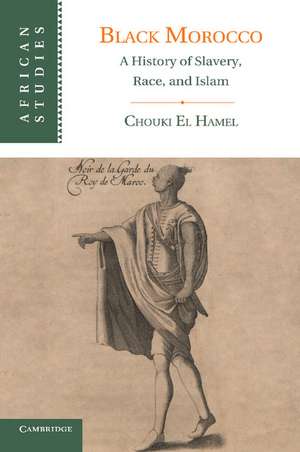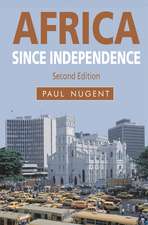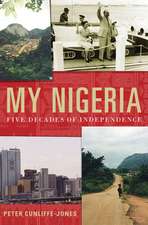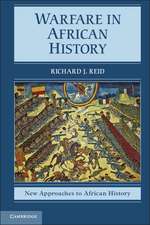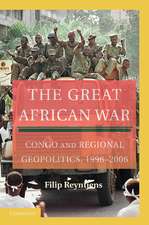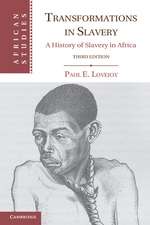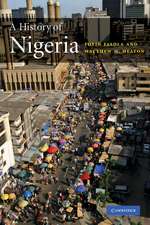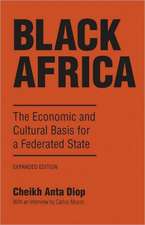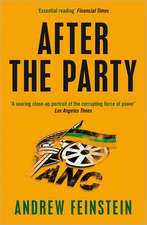Black Morocco: A History of Slavery, Race, and Islam: African Studies, cartea 123
Autor Chouki El Hamelen Limba Engleză Paperback – 26 feb 2014
Din seria African Studies
-
 Preț: 275.85 lei
Preț: 275.85 lei -
 Preț: 178.45 lei
Preț: 178.45 lei -
 Preț: 177.35 lei
Preț: 177.35 lei -
 Preț: 204.11 lei
Preț: 204.11 lei -
 Preț: 223.29 lei
Preț: 223.29 lei -
 Preț: 310.62 lei
Preț: 310.62 lei -
 Preț: 342.31 lei
Preț: 342.31 lei - 11%
 Preț: 696.80 lei
Preț: 696.80 lei -
 Preț: 184.93 lei
Preț: 184.93 lei -
 Preț: 238.11 lei
Preț: 238.11 lei -
 Preț: 177.35 lei
Preț: 177.35 lei -
 Preț: 208.26 lei
Preț: 208.26 lei - 23%
 Preț: 326.14 lei
Preț: 326.14 lei - 15%
 Preț: 459.92 lei
Preț: 459.92 lei - 15%
 Preț: 295.49 lei
Preț: 295.49 lei - 17%
 Preț: 296.11 lei
Preț: 296.11 lei - 18%
 Preț: 1001.24 lei
Preț: 1001.24 lei -
 Preț: 439.78 lei
Preț: 439.78 lei -
 Preț: 446.37 lei
Preț: 446.37 lei - 12%
 Preț: 301.75 lei
Preț: 301.75 lei - 30%
 Preț: 770.26 lei
Preț: 770.26 lei -
 Preț: 110.05 lei
Preț: 110.05 lei -
 Preț: 486.80 lei
Preț: 486.80 lei - 18%
 Preț: 995.09 lei
Preț: 995.09 lei - 18%
 Preț: 703.45 lei
Preț: 703.45 lei -
 Preț: 322.12 lei
Preț: 322.12 lei - 18%
 Preț: 1106.02 lei
Preț: 1106.02 lei -
 Preț: 480.24 lei
Preț: 480.24 lei - 18%
 Preț: 998.56 lei
Preț: 998.56 lei - 21%
 Preț: 182.41 lei
Preț: 182.41 lei -
 Preț: 489.10 lei
Preț: 489.10 lei -
 Preț: 477.72 lei
Preț: 477.72 lei - 25%
 Preț: 853.03 lei
Preț: 853.03 lei - 18%
 Preț: 179.93 lei
Preț: 179.93 lei - 26%
 Preț: 762.16 lei
Preț: 762.16 lei -
 Preț: 321.93 lei
Preț: 321.93 lei - 18%
 Preț: 710.05 lei
Preț: 710.05 lei -
 Preț: 273.50 lei
Preț: 273.50 lei - 16%
 Preț: 311.03 lei
Preț: 311.03 lei -
 Preț: 287.48 lei
Preț: 287.48 lei -
 Preț: 286.69 lei
Preț: 286.69 lei - 11%
 Preț: 694.23 lei
Preț: 694.23 lei
Preț: 202.11 lei
Nou
Puncte Express: 303
Preț estimativ în valută:
38.69€ • 42.04$ • 32.52£
38.69€ • 42.04$ • 32.52£
Carte disponibilă
Livrare economică 31 martie-14 aprilie
Preluare comenzi: 021 569.72.76
Specificații
ISBN-13: 9781107651777
ISBN-10: 1107651778
Pagini: 354
Ilustrații: 4 b/w illus.
Dimensiuni: 152 x 229 x 20 mm
Greutate: 0.52 kg
Editura: Cambridge University Press
Colecția Cambridge University Press
Seria African Studies
Locul publicării:New York, United States
ISBN-10: 1107651778
Pagini: 354
Ilustrații: 4 b/w illus.
Dimensiuni: 152 x 229 x 20 mm
Greutate: 0.52 kg
Editura: Cambridge University Press
Colecția Cambridge University Press
Seria African Studies
Locul publicării:New York, United States
Cuprins
Introduction; Part I. Race, Gender, and Slavery in the Islamic Discourse: 1. The notion of slavery and the justification of concubinage as an institution of slavery in Islam; 2. The interplay between slavery, race, and color prejudice; Part II. Black Morocco: The Internal African Diaspora: 3. The trans-Saharan diaspora; 4. 'Racializing slavery': the controversy of Mawlay Isma'il's project; 5. The Black Army functions and the role of women; 6. The political history of the Black Army: between privilege and marginality; 7. The abolition of slavery in Morocco; 8. The Gnawa and the memory of slavery; Conclusion.
Recenzii
'In Black Morocco Professor El Hamel argues persuasively that contrary to Islamic principles, Northwest Africans imposed a racial slavery upon the black peoples of the region. Drawing on a vast array of sources in Arabic and European languages, he focuses on Sultan Mawlay Ismail's enslavement of 221,000 black Moroccans in the late seventeenth century in order to form a slave army. These soldiers and their families leveraged the essential role they played in the Sultan's government and gradually freed themselves, though many fell back into slavery after the demise of the Sultan's dynasty. By recounting the waxing and waning fortunes of these black Moroccans … El Hamel elegantly demonstrates the heartbreaking ambiguity of racial slavery and servility.' Timothy Cleaveland, University of Georgia
'This is an important topic, ignored until recently. The slavery question is cleverly, soundly, and gently analyzed. A fascinating historical study (including gender differentiation), which may help for the future.' Catherine Coquery-Vidrovitch, Professor Emerita, Université Paris Diderot
'A powerfully written and provocative examination of slavery and the process of racialization in Morocco, bringing together North and West African scholarship in an imaginative and highly productive fashion. Sweeping in scope, impressively researched, and richly documented, El Hamel's achievement is at times mesmerizing; it constitutes a signal contribution to the study of slavery, race, and Islam. There is nothing quite like it.' Michael Gomez, New York University
'Black Morocco is an elegant, beautifully written, and thoroughly researched lesson for all scholars of the history of Africa, the Middle East, and slavery. El Hamel's work teaches us to look within, and also beyond, Islam, for answers to the experience and the conditions of slavery in Morocco. [He] teaches us to listen to the legacy of Moroccan slavery in Gnawa music, giving his readers the chance to hear the experience of slavery, and to honor its singers.' Eve Troutt Powell, University of Pennsylvania
'… a valuable contribution to North African historiography and the study of slavery … an important contribution not only to the study of slavery but also to the field of North African history. … Black Morocco offers us the most sustained and in-depth discussion of Mawlay Isma'il's army to date, and provides a solid overview of slavery in Morocco beyond this particular sultan's reign.' Jonathan Glasser, H-Atlantic
'Chouki El Hamel has given us a thorough, well-researched, engaging study of Islam, slavery, and race in Morocco. He weaves together Islamic jurisprudence, Moroccan court histories, European travel accounts, Sufi hagiography, diplomatic correspondence, and social history to explode long-standing cultural myths … El Hamel locates a window to the past in the black diasporic mystical culture of the present.' Ellen Amster, American Historical Review
'This is an important topic, ignored until recently. The slavery question is cleverly, soundly, and gently analyzed. A fascinating historical study (including gender differentiation), which may help for the future.' Catherine Coquery-Vidrovitch, Professor Emerita, Université Paris Diderot
'A powerfully written and provocative examination of slavery and the process of racialization in Morocco, bringing together North and West African scholarship in an imaginative and highly productive fashion. Sweeping in scope, impressively researched, and richly documented, El Hamel's achievement is at times mesmerizing; it constitutes a signal contribution to the study of slavery, race, and Islam. There is nothing quite like it.' Michael Gomez, New York University
'Black Morocco is an elegant, beautifully written, and thoroughly researched lesson for all scholars of the history of Africa, the Middle East, and slavery. El Hamel's work teaches us to look within, and also beyond, Islam, for answers to the experience and the conditions of slavery in Morocco. [He] teaches us to listen to the legacy of Moroccan slavery in Gnawa music, giving his readers the chance to hear the experience of slavery, and to honor its singers.' Eve Troutt Powell, University of Pennsylvania
'… a valuable contribution to North African historiography and the study of slavery … an important contribution not only to the study of slavery but also to the field of North African history. … Black Morocco offers us the most sustained and in-depth discussion of Mawlay Isma'il's army to date, and provides a solid overview of slavery in Morocco beyond this particular sultan's reign.' Jonathan Glasser, H-Atlantic
'Chouki El Hamel has given us a thorough, well-researched, engaging study of Islam, slavery, and race in Morocco. He weaves together Islamic jurisprudence, Moroccan court histories, European travel accounts, Sufi hagiography, diplomatic correspondence, and social history to explode long-standing cultural myths … El Hamel locates a window to the past in the black diasporic mystical culture of the present.' Ellen Amster, American Historical Review
Notă biografică
Descriere
Chronicles the experiences, identity, agency and achievements of enslaved black people in Morocco from the sixteenth century to the beginning of the twentieth century.
